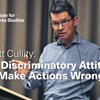bad

Åsa Wikforss: Bad Beliefs and Knowledge Resistance
Research seminar with Åsa Wikforss, professor of theoretical philosophy at Stockholm University and member of the Swedish Academy. Her research involves topics such as the philosophy of language, the
Åsa Wikforss: Bad Beliefs and Knowledge Resistance
Venue: Institute for Futures Studies, Holländargatan 13 in Stockholm, or online. Research seminar with Åsa Wikforss, professor of theoretical philosophy at Stockholm University and member of the Swedish

Reasoning like good lawyers or bad philosophers?
22 November, Institute for Futures Studies. A Multidisciplinary Look at Knowledge Resistance ’Knowledge Resistance: Causes, Consequences, and Cures' is a multidiciplinary research program, comprised o
Graham Oddie: What’s so bad about adaptive preferences?
Graham Oddie, Professor of Philosophy, University of Colorado Boulder Abstract Our desires and preferences change, but one particular kind of change in preferences has been singled out for opprobrium—so

Garrett Cullity: How Discriminatory Attitudes Can Make Actions Wrong
Research seminar with Garrett Cullity, professor of philosophy at the Australian National University, known for his research on moral philosophy. Abstract In general, otherwise permissible actions do

Garrett Cullity: How Discriminatory Attitudes Can Make Actions Wrong
Research seminar with Garrett Cullity, professor of philosophy at the Australian National University, known for his research on moral philosophy. Abstract In general, otherwise permissible actions do
Garrett Cullity: But Thinking Makes It So: How Discriminatory Attitudes Can Make Actions Wrong
Research seminar with Garrett Cullity, professor of philosophy at the Australian National University, known for his research on moral philosophy. Venue: Holländargatan 13, Stockholm Register here > Ab
Desirability of Conditionals
Synthese, Volume 193, Issue 6, pp. 1967–1981DOI: 10.1007/s11229-015-0823-0 Abstract This paper explores the different ways in which conditionals can be carriers of good and bad news. I suggest a general
The need for nuance in the null hypothesis significance testing debate
Educational and Psychological Measurement, Vol. 77 (2017), 4, p. 616-630. Abstract Null hypothesis significance testing (NHST) provides an important statistical toolbox, but there are a number of ways i
Axiological Retributivism and the Desert Neutrality Paradox
Campbell, T. Axiological Retributivism and the Desert Neutrality Paradox. Philosophies 2022, 7, 80. https://doi.org/10.3390/philosophies7040080 Abstract: According to axiological retributivism, people canan outcome in which someone gets what she deserves, even if it is bad for her, can thereby haveintrinsic positive value. A question seldom asked is how axiological retributivism should deal withcomparisons of outcomes that differ with respect to the number and identities of deserving agents.Attempting to answer this question exposes a problem for axiological retributivism that parallels awell-known problem in population axiology introduced by John Broome. The problem for axiologicalretributivism is that it supports the existence of a range of negative wellbeing levels such that if adeserving person comes into existence at any of these levels, the resulting outcome is neither betternor worse with respect to desert. However, the existence of such a range is inconsistent with a setof very plausible axiological claims. I call this the desert neutrality paradox. After introducing theparadox, I consider several possible responses to it. I suggest that one reasonable response, thoughperhaps not the only one, is to reject axiological retributivism.








